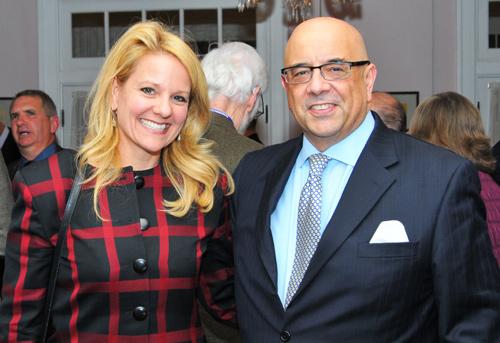Transportation Center Celebrates 60th Anniversary
With gala and summit, center explores present and future of transportation
By rail and road, water and air, the transportation industry helps the United States work. Yet political gridlock, price volatility, and declining infrastructure threaten to slow an industry that has been a key cog in American life across three centuries.
With a solutions-minded spirit, the Northwestern University Transportation Center (NUTC) celebrated its 60th year by gathering transportation industry insiders in Evanston on Nov. 13 and 14 to explore the transportation landscape’s major challenges and opportunities.
Faculty, alumni, and friends gathered for a gala dinner at the Women’s Club of Evanston on Nov. 13. The celebration featured keynote speaker Gwynne Shotwell (’86, MS ’88), president and COO of SpaceX. Shotwell shared videos of the company’s rocket launches and discussed plans to put the first people on Mars, a feat that she predicts will happen within 15 years.
 “It will be important to be able to move humanity to another location in case something terrible happens on Earth,” she said. “And something terrible will happen; it’s just a matter of when.”
“It will be important to be able to move humanity to another location in case something terrible happens on Earth,” she said. “And something terrible will happen; it’s just a matter of when.”
She told the audience to think about the trip to Mars like the Westward Expansion of the 19th century: it will take many months to reach the destination, but it will be worth it. “It will take a village to get to Mars,” she said. “The effort and logistics will be huge.”
On Nov. 14, transportation experts gathered to explore the future of transportation in the United States. In addition to a detailed presentation from Qantas Airways Head of Group Strategy Reed Tanger, who shared his Australian-based firm’s intense $1 billion turnaround story, the NUTC Transportation Summit included four dynamic panels delivering varied perspectives on supply chain, sustainability, finance and innovation.
Supply Chain Management
In a transforming field rife with headline-grabbing news of driverless vehicles, drones, 3D printing, and same-day delivery, Ken Heller, DSC Logistics vice president of supply chain excellence, urged attendees to think of supply chain as a strategic advantage, not a necessary evil. By using technology to increase productivity and accessibility and blending the experience and know-how of Baby Boomers with the data-savvy ways of Millennials, enterprises can capture results.
“Manufacturing made us great in the 20th century, but supply chains will make us great in the 21st century,” Heller said.
To counter the price volatility and price discovery issues that continue to plague supply chains, Echo Global Logistics CEO Douglas Waggoner floated the idea of a futures market for truckload capacity. That concept, he acknowledged, would require the industry to see truckload capacity as a commodity, a notion many have struggled to accept.
“But if we don’t look at these types of opportunities, we might miss an opportunity,” Waggoner said.
Sustainability and Logistics
The summit assembled a panel of leaders from the trucking, air, and barge industries to discuss a omnipresent buzzword in today’s transportation world: sustainability.
Angela Foster-Rice, United Airlines managing director of environmental affairs and sustainability, spoke of United’s push for fuel-efficient aircraft, winglet installations, and electric or alternative-fueled ground equipment. Sharing United’s goal of cutting its aviation carbon dioxide in half by 2050, Foster-Rice said the Chicago-based airline could not secure those results alone. She called for continued R&D to improve feedstock innovation and production technology, the acceleration of certifications for new jet fuels, and stable government policies to incentivize industry.
“We need to have a long-term vision and to do the work now,” she said.
In corporations’ rush to champion sustainability, however, Schneider President and CEO Chris Lofgren warned against taking one dimension of a problem and optimizing it, a process often littered with unintended consequences. He noted how environmental sustainability is only viable alongside economic sustainability.
“Sustainability and profitability can go hand-in-hand when done right and done thoughtfully,” Lofgren said. “It’s not either/or, but and.”
Financing Future Transportation
Former U.S. Deputy Secretary of Transportation Mortimer Downey called the freight system “a matter of national concern,” particularly given a growing national population, freight’s continued expansion, and weakening road and rail infrastructure. In addition to an influx of capital, Downey said the transportation sector must bring four million people on board over the next decade.
“We need to recover and focus on our needs,” Downey said.
Public-private partnerships and private equity were two solutions introduced by Norfolk Southern Corporation Vice President Robert Martinez and Scott-Macon Managing Director L. Price Blackford, respectively, while Martin Wachs, former director of the Institute for Transportation Studies at the University of California, touted the strategic plays of state and local governments. Rather than the industry wringing its hands about federal inaction, Wachs urged transportation leaders to investigate measures at the state, county, and local level to assess what’s working.
“There you’ll find that experimentation and innovation are alive and well in transportation finance,” Wachs said.
Technology and Innovation
The daylong summit concluded with a look ahead, specifically exploring the ways that innovation could propel the industry despite hurdles ranging from the long life of assets undermining the adoption of new developments to the time-consuming approach necessary to ensure safety.
Hideki Hada, general manager of Integrated Vehicle Systems for Toyota, said his team is focusing on two keywords: connected and automated. Toyota’s Advanced Driving Assist System products, for instance, include adaptive cruise control, night vision, and pedestrian detection, innovations aimed at improving transportation safety and eliminating traffic casualties.
GE Transportation product management executive Martin O’Neill promoted data analytics as one key to inspired, game-changing innovations in the transportation sector.
“We have to connect information,” O’Neill said, “and use what we have more effectively and more efficiently.”